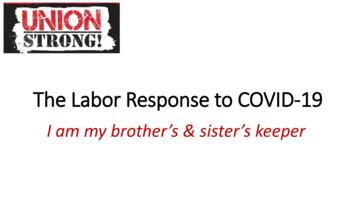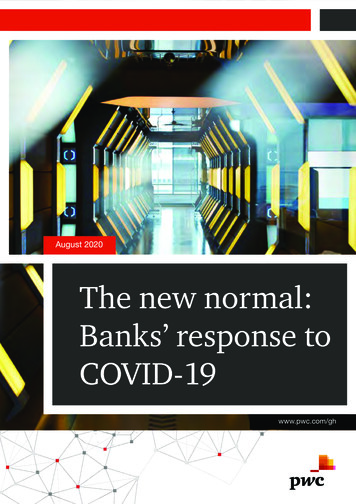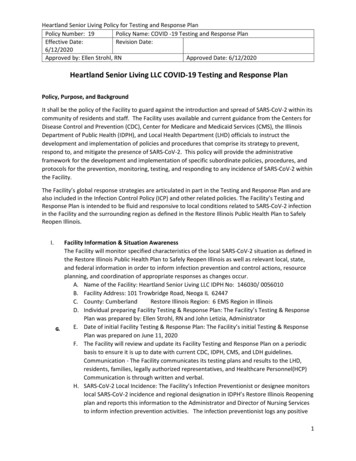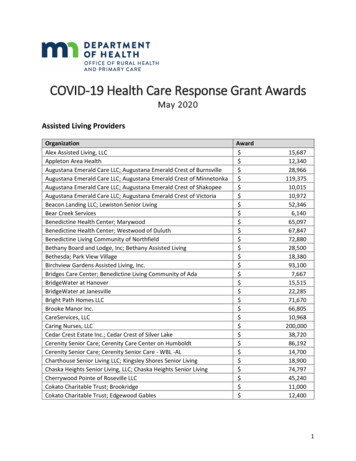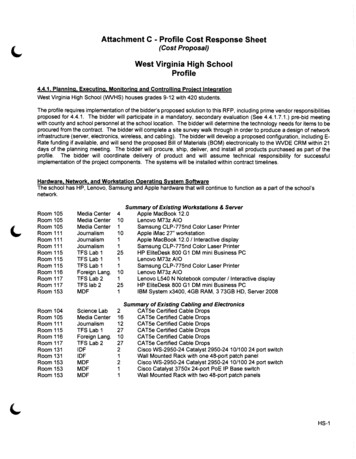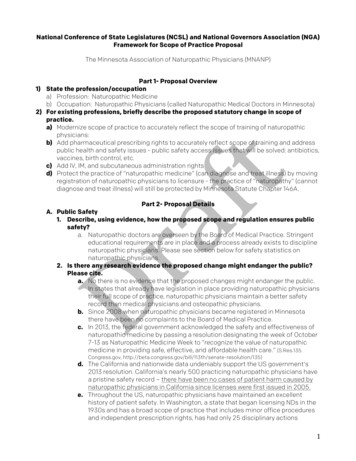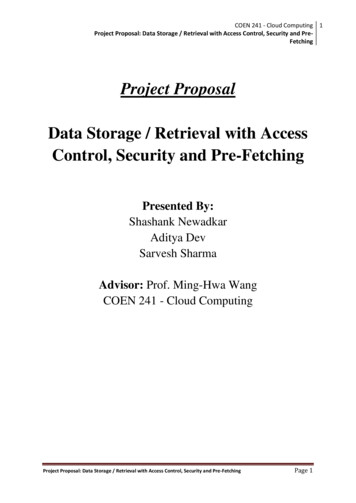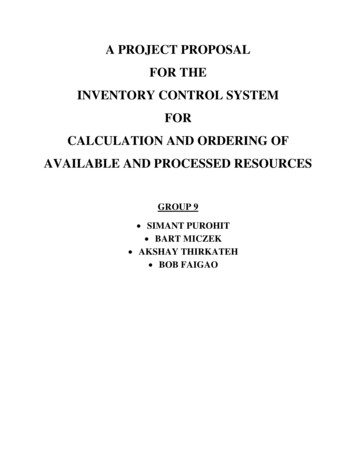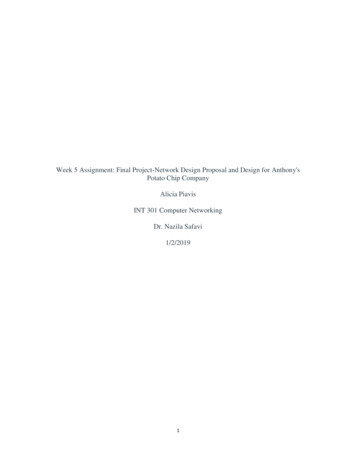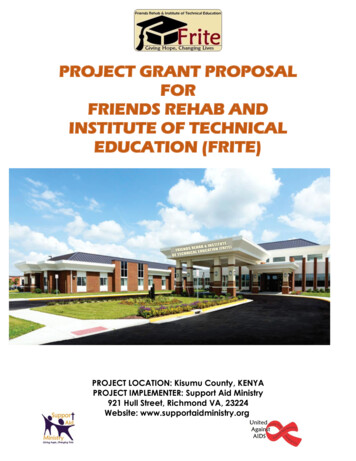
Transcription
Project Proposal – COVID-19 ResponseMarch 2020Tel: 0800 786 911, 27 (0)33 345 0163, 27 (0)33 345 0175Web: www.giftofthegivers.org Email: info@giftofthegivers.orgNPO: 032-031
Profile: Gift of the GiversThe Gift of the Givers Foundation is the largest disaster relief organisation of African origin on theAfrican continent. We have delivered over R2.8 billion in aid to 43 countries around the world. Wehave designed and developed the world’s first and largest containerised mobile hospital, which wasdeployed in Bosnia. It was comparable to the best hospitals in Europe and remains unmatched tothis day.Our assistance is purely humanitarian and unconditional. We assist irrespective of race, religion,colour, class, political affiliation or geographical boundary. We are entirely neutral in our approachto mankind in need, are non-judgemental and have an open-minded approach to all situations. Wework with governments to get our assistance delivered but do not align ourselves politically to anyparty. We have an excellent partnership relationship with the South African Government for thedelivery of our local projects, as well as for foreign aid delivery.Our projects cover 21 different categories covering the fields of education, health, povertyalleviation, disaster response and agriculture among others. These are administered by our teams inSouth Africa, Malawi, Zimbabwe, Somalia, Mauritania, Yemen, Palestine and Syria.We actively seek to build bridges between people of different cultures and religions engenderinggoodwill, harmonious coexistence, tolerance and mutual respect in keeping with the divineinjunction:"O Mankind! We created you from a single (pair) of a male and a female, and made you into nationsand tribes, that ye may know each other (not that ye may despise each other). Verily the mosthonoured of you in the sight of Almighty is (he who is) the most righteous of you." (Sura Hujurat/theInner Apartments, Chapter 49, Verse 13.)Tel: 0800 786 911, 27 (0)33 345 0163, 27 (0)33 345 0175Web: www.giftofthegivers.org Email: info@giftofthegivers.orgNPO: 032-031
Introduction and Context of the novel-coronavirus-2019/situation-reports)At the end of 2019 – several cases of pneumonia were reported in Wuhan City in China. In January2020, it was recognised as a new virus – in the same family of the SARS and MERS virus. The viruswas named COVID-19.By the end of January – several hundred cases were reported across China – and new casesidentified in Thailand, Japan and Korea. Most of these were traced back to people travelling fromWuhan City.The situation reports from the World Health Organisation show a rapid spread of the virus – both interms of number of people affected and the geographical regions. By March 2020 – Europe wasconsidered the epicenter of the disaster – with new cases being reported in the Middle East andAfrica. As at 17th March 2020 there are almost 180 000 confirmed cases and just under 7500 deathsreported.The spread of the disease was declared a global pandemic – with many countries instituting travelrestrictions, shutting down schools and universities, prohibiting public gatherings, encouragingvoluntary quarantine and taking measures to improve sanitation.With an increasing number of cases (62 confirmed) and the first confirmed cases of local spread South Africa followed suit – with President Cyril Ramaphosa declaring the COVID-19 a nationaldisaster.Approach to Disaster ResponseThe COVID-19 pandemic is unlike any other disaster that we have encountered before. There are anumber of challenges – including:-Lack of comprehensive information on the (newly discovered) virusThe speed at which it spreadsThe fact that South Africa is now experiencing local spreadThe high rates of HIV and TB amongst our populationThe already overburdened public healthcare facilitiesThe panic and fear in the general public – and the spreading of false informationThe treatment protocols requiring a different approach – especially when it comes toinfectionThe impact on schools, institutions and public gatherings – and the requirement to catch upon missed syllabus for many pupilsThe services that were rendered via the school – such as the nutrition programme ensuringthat kids receive a meal everydayThe secondary impact on jobs and productivity and the impact it has on already manystruggling businesses and employees that may be the sole breadwinners for their familiesTel: 0800 786 911, 27 (0)33 345 0163, 27 (0)33 345 0175Web: www.giftofthegivers.org Email: info@giftofthegivers.orgNPO: 032-031
The address from the President and the measures announced in the speech are a step in the rightdirection – and should hopefully prevent a full-scale disaster. However, the state, the corporatesector, non-profit organisations and the public as a whole – all have a role to play.A national plan covering the among other essential aspects: communication and risk awareness;monitoring of new cases and disease spread; controlling the points of entry/exit (land, sea and air);scaling up facilities for testing and treatment – and the influx of patients; disease prevention andcontrol – including the need for specially allocated quarantine facilities for infected patients; has tobe managed centrally by the state.Gift of the Givers Foundation will act in a supporting role – assisting the state healthcare facilities.Given the many unknowns – it is extremely challenging to draw up a plan to address all issues –especially where it requires huge financial resources from the state. However, there are generalprinciples that will guide our interventions:1. The need to act on rational and real evidence – not on fear and hype.2. Given the potential scale of the problem – realistically, it is not possible to assist everyone.We need to recognize that some people are more at risk than others – especially people thathave been affected. Resources have to be prioritized appropriately – and the guidelines fromthe state and the NICD try to take this into account.3. While the fear may be around the COVID-19 strain – the existing healthcare challenges andpatients should not be compromised.4. There is a need to be prepared for different stages of the pandemic – with a large focus onprevention and mitigation – which will hopefully be successful in preventing a full-scaledisaster5. The intervention of Gift of the Givers will be primarily focused in South Africa – and may beextended to regions where we have our own teams. Any region outside our areas ofoperation need to have special motivation.Tel: 0800 786 911, 27 (0)33 345 0163, 27 (0)33 345 0175Web: www.giftofthegivers.org Email: info@giftofthegivers.orgNPO: 032-031
Current InterventionsAfter consulting with professionals and decision-makers at different levels of government – includinga number of hospitals, the private sector as well as many of the medical volunteers – several areashave been identified as being practical areas where Gift of the Givers can add value.Reduce Risk of Spread and Burden on State Hospitals and ResourcesOne of the key lessons that Gift of the Givers has learnt through the experiences of responding tomultiple disasters – is that regular ailments, and medical incidents and accidents continue. Thismeans that there is a need to be prepared for the disaster – while maintaining capacity to respondto the regular medical requirements.The risks for immune compromised people and the fear and anxiety created by the COVID-19 virus –places a burden on the healthcare facilities. Questions arise related to:-How to assist patients that may be healthy or have the common cold or flu-like symptoms –but need reassurance of the health status?How to prevent an infected person from spreading the disease to other patients (immunecompromised) seeking treatment at the hospital?Hospitals will still see medical and trauma patients. How to prioritise patients – so thatCOVID-19 cases are not ignored/missed – but that the standard of treatment and responsetimes for other severe cases is still maintained?This is not easy to answer and requires multiple, concurrent initiatives:--Hospitals have already indicated that non-essential and elective procedures will bepostponed. This will reduce the load on medical staff and also increase the number of bedsavailable.The state has already designated a number of hospitals to isolate and manage infectedCOVID-19 patients.A number of support centres – providing email, WhatsApp and telephonic support havebeen set up.A set of guidelines has been prepared for laboratories and hospitals providing testing andtreatment.These are all great initiatives. To support and supplement these initiatives – Gift of the Givers haveidentified the following interventions:Tel: 0800 786 911, 27 (0)33 345 0163, 27 (0)33 345 0175Web: www.giftofthegivers.org Email: info@giftofthegivers.orgNPO: 032-031
Provision of Medical SuppliesThis will be done in controlled manner and will initially focus on healthcare professional at stateinstitutions. The price and availability of the N95 or similar masks have created a problem for peoplewanting to assist. While this is not yet a major issue – Gift of the Givers has sourced 10000 FFP2masks and identified a few hospitals that require these. The list of these facilities was provides bythe National Department of Health.There have been a number of requests for sanitiser. As far as possible – water and soap should beused to avoid an artificial demand. Where there are institutions that have a lack of running water –we are willing to provide sanitisers. This again will be done via the hospitals or in coordination withthe Department of Health.Gift of the Givers will NOT be going on a drive to collect or distribute these supplies at schools or toindividuals – as in this case – it is neither practical nor a priority.Additionally, as is our normal procedure – Gift of the Givers facilitates the donations of medicinesand medical supplies from companies to state-run hospitals where we have a long-standingpartnership. The medical staff and management of these hospitals are transparent and providefeedback on the usage and disbursement of the donation. This will continue.Availability of Medical EquipmentReports from Europe and the United States mentioning the lack of ventilation equipment as one ofthe major challenges that prevented patients with severe respiratory symptoms from receiving lifesaving treatment.It is not enough to simply purchase more ventilators and related equipment. Unfortunately, many ofthe public hospitals still lack the bed space and dedicated personnel to utilise this equipmenteffectively and efficiently. Given that the public facilities are already operating under severe strain –the simple provision of equipment will not solve the problem.Secondly, there is still hope, that by taking the preventative and mitigating measures as a country –this phase could be avoided.However, due to the demand that is now created for these devices – it is not possible to procurethem quickly. Gift of the Givers medical team maintain equipment to set up a field hospital fromscratch – this includes four ventilators, five monitors and three oxygen machines. These machinesare currently being calibrated, tested and supplies procured to ensure that if the need arises – theycan be provided at no cost to a state institution – for the duration of the pandemic.Tel: 0800 786 911, 27 (0)33 345 0163, 27 (0)33 345 0175Web: www.giftofthegivers.org Email: info@giftofthegivers.orgNPO: 032-031
Pre-triageA number of doctors at state hospitals have requested assistance to create “pre-triage” facilitiesaway from the main hospital building.The idea is that:--Patients seeking non-virus related treatment/support – are directed to the regular hospitalfacilities.Patients that enter – that are deemed high-risk for corona (visual assessment) – areimmediately directed to an isolated area of the hospital to get a proper test donePatients that are low-risk and showing some symptoms are directed to a separate area forassessment and patient history. Due to the cost-implications of the tests - only patients thatfit the category of needing tests are directed to the hospital lab. Low-risk/No-risk patientsare attended to and advised on preventative and monitoring measures to put in place.Low-risk patients that insist on getting tested are directed to private facilities.Gift of the Givers is willing to intervene in this aspect – by:--Erecting and/or equipping temporary zones for pre-triage within the hospital areaProvision of medical personnel – volunteers offering their services at no charge OR wherenecessary a nurse or doctor to be paid for a period of up to six months. These medicalpersonnel would have to work under the supervision of full-time hospital employees.Consumables (masks, gloves, sanitisers, etc) that would be requiredWhere the personnel (volunteer or paid) are supplied by Gift of the Givers – basic equipmentsuch as BP monitors, stethoscopes and basic examination tools will be suppliedWe are currently discussing this proposal with a number of hospitals – as there are implications ofproviding external medical personnel and consumables to hospitals – both in terms of risk/liability aswell as supply-chain regulations.Reduce the cost of Screening for Private PatientsIt is not financially viable for the state to test everyone. The cost (not just financial) will be too great.This means that many people would have to seek the services in the private sector. The currentadvertised rate for a COVID-19 test at a private institution is over R1400. Not all medical aids arewilling to cover this cost. Gift of the Givers is leveraging its existing project – where Mullah Labs, aprivate pathology practice provides reduced rates for people that cannot afford medical aid orprivate healthcare. Up until now – we have successfully managed to reduce the cost to R750 perpatient – and are trying to bring this down even further.We will be looking to private funders that would be willing to subsidise poorer patients – especiallyvulnerable persons that have a history of exposure.Tel: 0800 786 911, 27 (0)33 345 0163, 27 (0)33 345 0175Web: www.giftofthegivers.org Email: info@giftofthegivers.orgNPO: 032-031
Access to WaterThe most common advice offered by any professional or institution is – wash your hands with soap.This is great advice for preventing the spread of the virus. However, the sad reality is that millions ofSouth Africans still do not have access to running water. Not just individuals – but a number ofhospitals also face severe shortage or challenges in obtaining a regular and reliable supply of water.Gift of the Givers water projects – including the distribution of bottled water (although significantlyreduced), water tankers, and the drilling and equipping of boreholes will continue. Recently, severalhospitals were identified as recipients. With the threat of the COVID-19 virus – site selection will bebiased towards hospitals – so that they can continue to function as well as provide a basic minimumlevel of sanitation and disease control – that is simply not possible without water.Access to Basic Supplies and Provision of FoodThis is an area of major concern in the context of capacity and logistical support. The assumptioncurrently is that there would be a breakdown of primary services regarding the delivery of food andbasic necessities to vulnerable committees throughout the country, most particularly those thatreside in rural areas. Gift of The Givers has implemented a disaster mitigation plan which includes the following:Disaster preparedness which includes the stockpiling of foods, medical supplies and sanitarypacks for the lockdown period and beyondArranging with our key supplies to hold on demand essential commodities for immediateavailabilityThe regular monitoring are constitutions such as homes for the disabled, orphanages, frailcare centres etcTo continue our feeding scheme at hospitals and other institutions which depend on ourservicesThe increase in co-operation between the various stakeholders are from government andcommunity representatives to enhance our capacity to deliver emergency and essentialservices when requiredEducation and AwarenessWhile the measures announced by the President – it will not have the desired impact if the public donot follow the guidelines. Key messaging has to be maintained:-Symptoms and identifying your risk profile – should you go for testingTel: 0800 786 911, 27 (0)33 345 0163, 27 (0)33 345 0175Web: www.giftofthegivers.org Email: info@giftofthegivers.orgNPO: 032-031
-Infection Prevention and Control (washing hands, cleaning of surfaces, avoid shaking hands,etc)When and how to self-quarantineWhat to do if you have been tested and confirmed to be infected – no reason to panicContact information for designated hospitals and testing centresContact information for support linesInformation on where to seek advice/further assistanceInformation on how to donate/provide assistanceGift of The Givers has an inhouse tollfree careline, supervised by a qualified Psychologist,which focuses on a number of issues including Gender-based violenceand Intimate Partner violence.There are a number of agencies that have already prepared very useful and effective messaging. Itcan simply be packaged and provided to the public in easy-to-digest bits – and continuallyreinforced. Examples could be to play the videos on promotional screens in-store or within a bank.Unfortunately, there is a lot of misinformation and bad advice being circulated – especially on socialmedia. Additionally, there are a number of well-meaning individuals/entities – that want to providesome sort of relief – but without the proper measures in place to prevent or control the spread ofinfection – these may actually have negative effects.Longer-term ProposalsAs soon as the COVID-19 virus is considered to be contained – and the risk is reduced – people willbe eager to return to some form of normalcy as soon as possible. At this point – one of the mostimportant interventions we are considering is how to assist educators and learners – especially inmatric – to complete the syllabus. These are currently open-ended and needs further thoughts – asthe focus at the moment is on the medical aspects of the crisis.Tel: 0800 786 911, 27 (0)33 345 0163, 27 (0)33 345 0175Web: www.giftofthegivers.org Email: info@giftofthegivers.orgNPO: 032-031
More and more, countries are entering a phase of lockdowns, which severely impacts the economiesof the globe. The South African government has announced measures to not only combat the spreadof the virus, but to support those hit most severely, whether the poor, informal traders, small andmedium businesses or the homeless. Government relief measures in neighboring countries,Botswana, Namibia and Zimbabwe may not be as comprehensive as the countries are less strongeconomically. It is in this context that the region is looking to support government actions to reducethe impact of the virus on the most affected in our communities.In understanding the impact on our communities, we need to recognise that we have a significantnumber of employees living in these communities who are exposed to the same risks as our localcommunity members. These communities are often subject to high levels of unemployment, poorhousing in some areas, poor service delivery and a high percentage of elderly and child headedhouseholds, which will increase the risk of the spread of the virus impacting our employees and thecommunities at large.The proposed Community Response Plan has been developed by engaging with our communities,traditional and faith leaders and government agencies to understand their identified needs across theregion. Once the needs were established, they were consolidated across the various operations toidentify common themes.The themes were further prioritised based on: intervention with greatest impact of infection control, early detection through temperature testing, consideration of supply chain bottlenecks, alignment with government guidelines.This gave us the immediate priorities that we believe will have the greatest impact on ourcommunities and our employees who live in these communities.Our Regional Priorities are deemed to be:a. Community Vulnerability Assessment and Supportb. Food Security for Vulnerable, Quarantined Householdsc. Water Provisiond. Local Government Clinic Supporte. WeCare Plus CommunityTel: 0800 786 911, 27 (0)33 345 0163, 27 (0)33 345 0175Web: www.giftofthegivers.org Email: info@giftofthegivers.orgNPO: 032-031
Potential for CollaborationThe areas of collaboration would ideally be in: Food Security – either for individuals or families that have to undergo voluntary isolation orquarantine, as well as families that have suffered a loss of incomeWater Provision – clean water for drinking and sanitation is not only an essential right – butalso a key aspect in the fight of the spread of the virusSupport for Healthcare institutionsThe response will need to take into account the needs of the community, but also respect the rulesof the lockdown as well as the prescribed precautions to reduce and avoid the spread of the disease.Food SecurityThe normal modus operandi of the Gift of the Givers teams is to identify local leaders (through tribalor community structures) through which an accurate assessment of the community can be provided.A Gift of the Givers Community Liaison Officer (CLO) will be dispatched to the area to meet with thecommunity representative/tribal chief – with the aim of verifying the information provided. This stepis the first step to building trust and ensuring that the partner on the ground represents the needs ofthe community.Once this is done the next step is to establish the needs, quantities and intervals that are required aspart of the intervention.A general food parcel will contain: MaizeRiceSugar BeansSaltSugarCooking OilTea/CoffeeJam/Peanut ButterLong Life MilkBaked BeansTin FishNoodles/Macaroni/SpaghettiItems can be added/removed and the sizes varied – based on: Financial BudgetTel: 0800 786 911, 27 (0)33 345 0163, 27 (0)33 345 0175Web: www.giftofthegivers.org Email: info@giftofthegivers.orgNPO: 032-031
Balancing the weight and volume (optimizing logistical costs)The demographic of the populationThe proximity of the distribution point to their homes (and the availability of transport)While the common option is to put in as many items as possible – the problem arises when peoplecannot transport their hampers to their homes (e.g. the elderly or people living far away). In general,a 30kg to 35kg hamper is reasonable and can be completed at a price of about ZAR450.00 includingpacking and transport.Water ProvisionGift of the Givers has been working in water-scarce communities in South Africa (and other parts ofthe world) and have experience with a number of different approaches. Depending on eachcommunity – the following will have to be clarified:Does the community already have access to a reliable supply of clean, potable water?If not – is there a water source nearby that can provide water to the community?If there is a water source – how accessible is it? What can be done to improve the access?If there is no existing water source – is it possible, and more importantly, is it feasible to drill aborehole to provide water to the community?The answers to these questions will generally guide the response. This could be any (orcombinations) of the following:--Drilling new boreholes within or near to the communities (preferably within communitycentres such as schools, clinics, tribal courts or even the police station).Identifying if there are existing boreholes that have suitable water quality and yields thatsimply need to be activatedIdentify If there are existing boreholes – that have a significant yield – that can be developedto service a larger population than it is currently – by adding pumps and pipelines to extendthe water system closer to the affected communityIdentify if there are existing boreholes or other water sources – where tankers can be filledand then used to deliver waters to tanks in nearby communitiesWhile all of the above may be possible – the COVID-19 virus means that there is a need to workmore urgently to a solution. While it is possible for Gift of the Givers to quote on the sighting,drilling, equipping and maintenance of boreholes (which will be in the range of R350k per borehole)– there may be existing options that can provide faster and more cost-effective solutions.-Is it possible to open these sites or make water available from these sites to thecommunities (by adding tanks or taps)Tel: 0800 786 911, 27 (0)33 345 0163, 27 (0)33 345 0175Web: www.giftofthegivers.org Email: info@giftofthegivers.orgNPO: 032-031
Support for Healthcare FacilitiesThis is something that is absolutely necessary. The public healthcare system is already under severestrain – even before the COVID-19 outbreak. Lack of personnel, resources, consumables and suppliesare commonplace. While the big focus may be on COVID-19 or potential patients with COVID-19,there are still the common day-to-day problems for which people seek treatment. There are alreadya number of medical professionals that are afraid to provide treatment – even for regular patients –due to fear of being infected with the Corona Virus. This is not from lack of commitment – but fromlack of basic protective supplies.With the above said – the Department of Health at national and provincial level has a responsibilityto provide the required gear to medical and support staff in the communities. As and NGO and theprivate sector – with finite resources – a blanket approach of supplying all clinics with supplies willneither be practical nor cost-effective. Clinics need to be prioritized based on a number of factors:-Vulnerability and Risk Assessment – i.e. what is the likelihood of COVID-19 exposure andinfectionNumber of patients visiting the clinic for medical assistanceAbility for the clinic to refer patients to larger facilities (and even hospitals) – wheretreatment may be soughtProximity and ability for follow up, monitoring and evaluationBy prioritizing sites in this manner – resources don’t have to be split evenly or “fairly” – but arerather distributed in a way that will maximize efficiency and reduce the risk of infection as far aspossible. With this being said – there is new information being released about this strain of the virusvery frequently – with experts often contradicting each other. This may affect how the vulnerabilityand risk assessment is carried out – but the overall approach will remain.Tel: 0800 786 911, 27 (0)33 345 0163, 27 (0)33 345 0175Web: www.giftofthegivers.org Email: info@giftofthegivers.orgNPO: 032-031
In Summary:Time does not permit me to present a thorough biopsy of our disaster response strategies andIntervention.The current situation in lockdown mode, calls us to re-examine our modus operandiand operate in a different space. Hence, we contacted all stakeholders and partners which includeall tiers of the Department of Social Development, Disaster Management, National Health, thevarious Municipalities, Civil Society and Ngo’s to strengthen corporation and encourage thecollaborative efforts to fight the immense challenges facing South African Society.There is an urgent need for us to act in the present and we have over the past 27 years builta solid reputation for integrity and transparency amongst our citizens and those around the world.Our International and local track record will testify our suitability to bring relief interventiontimeously.Tel: 0800 786 911, 27 (0)33 345 0163, 27 (0)33 345 0175Web: www.giftofthegivers.org Email: info@giftofthegivers.orgNPO: 032-031
Profile: Gift of the Givers The Gift of the Givers Foundation is the largest disaster relief organisation of African origin on the African continent. We have delivered over R2.8 billion in aid to 43 countries around the world. We have designed and developed the world’s first and largest con
